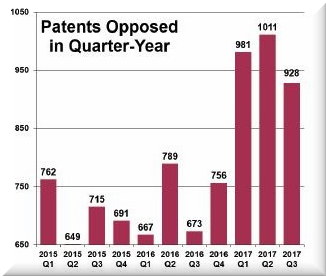
Image credit: James Ward and Frances Wilding, Haseltine Lake LLP
Summary: The rush to grant lots and lots of patents at the EPO is already taking its toll; quality is declining, decisions to grant are being overturned, and the already-overburdened appeal boards are unable to catch up
THE OPPOSITIONS at the EPO are soaring. People (and firms) are evidently not happy with the patents being granted and oppositions are filed at a rate the EPO might not be able to suitably keep up with.
A week ago (6 days to be exact) an opposition to a CRISPR patent was successful. We wrote about that
yesterday,
on Saturday, Wednesday [
1,
2],
Thursday and
Friday.
IP Kat (Rose Hughes) finally
wrote about it almost one week later. Cantargia AB's press release, in our view, is still being spread amid panic over the CRISPR patent's invalidation. This is from yesterday alone [
1,
2]; what seems to be their staff was in touch with us and did not deny our suspicions. All these oppositions are becoming a great risk to some companies which invested a lot of money in questionable European Patents.
Yesterday/earlier this week, probably as one might expect, the Wall Street media wrote about this also [
1,
2]. Bloomberg neglected to speak to any rights groups that oppose patents on life. Pure business spin is what these articles/blogs boil down to. The author relays the 'damage control'. "Meanwhile," he wrote, "it could take a while for the appeal to wend its way through the European system, Brent Babcock, an intellectual property lawyer with Knobbe Martens in Irvine, Calif., told me in a Jan. 19 telephone call."
There's a big backlog. In order to crush the patent applications backlog Battistelli has created a massive queue at the IAC, the ILO, BoA, and Oppositions. Well done, eh? By ramming down bad European Patents down the EPO's mouth Battistelli has caused enormous and possibly irreversible damage. Had patent examination been done thoroughly and patiently, maybe Broad wouldn't have been granted the CRISPR patent in the first place. Now see
this comment (first one at
IP Kat) from "The Convention watchdog":
The reason for the "early" end of the oral proceedings was not that the priority question was not sufficiently discussed. On the contrary, the discussion covered all aspects brought forward by the parties and based on numerous legal expert opinions. Rather, a discussion on novelty and inventive step did not take place as expected, since the proprietor submitted new claim requests which the Opposition Division did not admit into the proceedings. As to the substance of the priority question, one may mention that the problem is not so much the general difference between US and EP law, but the difference between US law on internal priorities and the law of the Paris Convention on priorities.
Had more time been given for examiners, would such a disaster have been averted? Here is another comment:
The Broad Institute proclaims themselves confident that “the EPO will, on appeal, harmonize the EPO procedures to be consistent with international treaties and compatible with the fundamental principles of the Paris Convention”.
The EPO may follow the PCT rules and articles, but the PCT has so many "if national laws allow", "if not contravening national law", that it is obvious that the national law stands above the PCT.
And the EPO has not signed other international treaties, and will therefore not be bound by them, EVEN IF every single member state has signed and ratified that treaty.
As many articles about the EPO confirm, the EPOrg and the EPOff have little interest in international treaties, international standards, or complying with generally acknowledged principles of law, if there is no clear indication within the EPC to do so.
I see this statement and the filing of the appeal as a try to keep at least something of the cake, and a try to tell imvestors that not everything is lost, and that they please do not sell the shares yet.
Broad is now suffering because a patent that should not have been granted was in fact granted, giving investors false hopes and unrealistic expectations. Now there may be years of uncertainty.
What does all this make the EPO look like? What happens to the certainty associated with patents that EPO examiners
used to grant (before the so-called 'reforms')?
⬆

